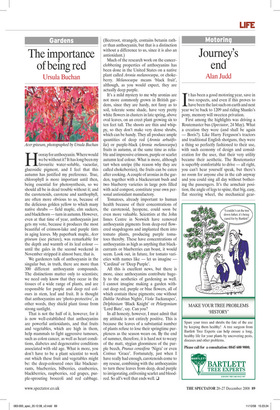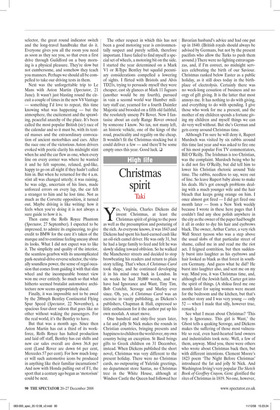Journey’s end
Alan Judd
It has been a good motoring year, save in two respects, and even if this proves to have been the last such on earth and next year we’re back to 1209 and riding Shanks’s pony, memory will sweeten privation.
First among the highlights was driving a Routemaster bus (Spectator, 24 May). What a creation they were (and shall be again — Boris?). Like Harry Ferguson’s tractors and traditional English shotguns, they were a thing so perfectly fashioned to their use, with such economy of design and consideration for the user, that their very utility became their aesthetic. The Routemaster is superbly comfortable to drive — all right, you can’t hear yourself speak, but there’s no room for anyone else in the cab anyway and you could sing all day without bothering the passengers. It’s the armchair position, the angle of legs to spine, that big, easy, flat steering wheel, the mechanical gear selector, the great round indicator switch and the long-travel handbrake that do it. Everyone gives you all the room you need as soon as they see you, so that even a first drive through Guildford on a busy morning is a physical pleasure. They’re slow but not cumbersome, and somehow they teach you manners. Perhaps we should all be compelled to take our driving tests in them.
Next was the unforgettable trip to Le Mans with Aston Martin (Spectator, 21 June). It wasn’t just blasting round the circuit a couple of times in the new V8 Vantage — something I’d love to repeat, this time knowing what was happening — but the atmosphere, the excitement and the sprawling, peaceful anarchy of the place. It’s been called the most popular British (sic) race of the calendar and so it must be, with its tented masses and the extraordinary convocation of ancient motorbikes and cars. After the race one of the victorious Aston drivers evoked with poetic clarity his midnight stint when he and the car flew as one, when every line on every corner was where he wanted it and he felt supreme, relaxed, god-like, happy to go on all night if they hadn’t called him in. But when he returned for the 4 a.m. stint all was changed utterly; it was raining, he was edgy, uncertain of his lines, made unforced errors on every lap, the car felt a stranger to him and he lost time. Not as much as the Corvette opposition, it turned out. Maybe driving is like writing: how it feels when you’re doing it is not always a sure guide to how it is.
Then came the Rolls Royce Phantom (Spectator, 27 September). I expected to be impressed, to admire its engineering, to give credit to BMW for the care it’s taken of the marque and to continue feeling uneasy about its looks. What I did not expect was to like it. The simplicity and quality of the interior, the seamless gearbox with its uncomplicated park-neutral-drive-reverse selector, the virtually soundless power, the sense of regal occasion that comes from guiding it with that slim wheel and the incomparable bonnet view won me over entirely. So much so that what hitherto seemed brutalist automotive architecture now seems appropriately ducal.
Finally, it was impossible not to be awed by the 200mph Bentley Continental Flying Spur Speed (Spectator, 22 November), a spacious four-door saloon that goes like no other without waking the passengers. For the real world, it’s the Bentley to have.
But that was a month ago. Since then Aston Martin has cut a third of its workforce, Rolls Royce has halted production and laid off staff, Bentley has cut shifts and new car sales overall are down 36.8 per cent (Land Rover are down 64 per cent, Mercedes 57 per cent). For how much longer will such automotive icons be produced in anything like their familiar incarnations? And now with Honda pulling out of F1, the sport that a century ago began as ‘motorism’ could be next. The other respect in which this has not been a good motoring year is environmentally suspect and purely selfish, therefore important. I have failed to find myself a special set of wheels, a motoring bit on the side. I started the year determined on a Mark V1 or R-Type Bentley but squalid pecuniary considerations compelled a lowering of sights. I flirted with Bristols and Alvis TD21s, trying to persuade myself they were cheaper, cast sly glances at Mark 11 Jaguars (another would be my fourth), pursued in vain a second world war Humber military staff car, yearned for a fourth Daimler Majestic and brooded on a fifth old faithful, the resolutely unsexy P4 Rover. Now I fantasise about an early Range Rover owned by someone I know. No tax, not many left, an historic vehicle, one of the kings of the road, practicality and regality on the cheap. It wouldn’t fit the Christmas stocking but it could deliver a few — and there’ll be some empty ones this year. Good luck. ❑























































































































 Previous page
Previous page